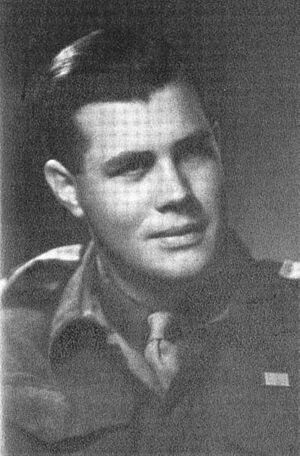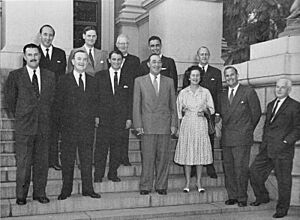Colin Eglin facts for kids
Quick facts for kids
Colin Eglin
|
|
|---|---|

Eglin during World War II
|
|
| Leader of the Progressive Federal Party | |
| In office 1977–1979 |
|
| Preceded by | Office established |
| Succeeded by | Frederik van Zyl Slabbert |
| In office 1986–1988 |
|
| Preceded by | Frederik van Zyl Slabbert |
| Succeeded by | Zach de Beer |
| Leader of the Progressive Reform Party | |
| In office 1975–1977 |
|
| Preceded by | Office established |
| Succeeded by | Office abolished |
| Leader of the Progressive Party | |
| In office 1971–1975 |
|
| Preceded by | Jan Steytler |
| Succeeded by | Office abolished |
| Personal details | |
| Born | 14 April 1925 Sea Point, Cape Town, Cape Province, Union of South Africa |
| Died | 29 November 2013 (aged 88) Cape Town, Western Cape, South Africa |
| Citizenship | South African |
| Political party | Democratic Alliance (2000–2013) |
| Other political affiliations |
Democratic Party (1989–2000) Progressive Federal Party (1977–1989) Progressive Reform Party (1975–1977) Progressive Party (1959–1975) United Party (before 1959) |
| Alma mater | University of Cape Town |
| Military service | |
| Allegiance | Union of South Africa |
| Branch/service | South African Defence Forces |
| Years of service | 1943–1946 |
| Battles/wars | World War II |
Colin Wells Eglin (born 14 April 1925 – died 29 November 2013) was an important South African politician. He is best known for leading the opposition party against the government during the difficult time of apartheid. He served as the leader of the opposition from 1977 to 1979 and again from 1986 to 1987. Eglin represented the Sea Point area in the South African Parliament for many years, from 1958 to 1961 and then from 1974 to 2004. Nelson Mandela, a famous leader, called Eglin "one of the architects of (South Africa's) democracy." This means Eglin played a big part in creating South Africa's new constitution after apartheid ended.
Contents
Early Life and Education
Colin Eglin was born in Sea Point, Cape Town, on 14 April 1925. His parents, Carl August Eglin and Elsie May Wells, were South Africans of British background. Colin was only nine years old when his father passed away in July 1934. He later wrote about his father's strong Christian faith. His mother died in 1958.
Military Service During World War II
In 1943, Colin Eglin paused his studies to join the South African Army. This was during World War II. He became an instructor for an anti-aircraft unit in Cape Town. Later, he was sent to a similar unit in Kingdom of Egypt and then to Italy. He bravely took part in the South African attack on Monte Sole. This battle helped the Allies break through to the plains of Italy.
After the war ended, he stayed in Italy for nine months while waiting to return home. During this time, he took extra courses in subjects like archaeology and town planning. In 1946, he graduated from the University of Cape Town with a degree in quantity surveying. This field involves managing costs for building projects.
Beginning His Political Journey
Colin Eglin started his political career in local government. He was a member of the Pinelands Municipal Council from 1951 to 1954. In 1954, he was elected as a Provincial Councillor for the Cape Province, representing the United Party. He held this position until 1958.
In 1958, he was elected as a Member of Parliament (MP) for the Peninsula area without anyone running against him. However, he soon left the United Party. In 1959, he became one of the founding members of the Progressive Party. Because of this change, he lost his MP seat in the 1961 general election.
Leading the Progressive Party
Colin Eglin became the leader of the Progressive Party in February 1971. At first, he was not in Parliament. But in April 1974, he was elected as the MP for the Sea Point area in Cape Town. Five other Progressive Party candidates also won seats, joining Helen Suzman in Parliament.
Fighting Against Apartheid in Parliament
In February 1975, another liberal leader named Harry Schwarz was removed from the United Party. He and others formed the Reform Party. The Progressive Party and the Reform Party both opposed apartheid. They decided to join forces.
Forming New Parties
In July 1975, the two parties merged to create the Progressive Reform Party. Colin Eglin was chosen as its leader. He then became the leader of the Progressive Federal Party in 1977. This happened after another group, the Committee for United Opposition, also joined them.
Eglin served as the leader of the official Opposition in Parliament from 1977 to 1979. This meant he was the main voice speaking against the ruling government. In 1979, Frederik van Zyl Slabbert took over as party leader. Eglin then became the Shadow Foreign Minister, focusing on international relations, until 1986.
Returning to Leadership
From 1986 to 1988, Colin Eglin again became the party leader after Slabbert resigned. He was the official Opposition leader until 1987. At that point, the right-wing Conservative Party became the official opposition. In 1988, Zach de Beer took over as leader of the Progressive Federal Party.
The party continued to evolve. In 1989, it merged with other groups to form the Democratic Party. Then, in 2000, it became the Democratic Alliance.
Colin Eglin continued to serve in the House of Assembly, which was segregated during apartheid. When apartheid ended in 1994, he served in the new, multi-racial National Assembly in the Parliament of South Africa. He retired from Parliament in 2004.
Awards and Recognition
Colin Eglin received several honors for his important work. In 2005, he was made an Officer of the Order of the Disa. In April 2013, he was awarded the Order of the Baobab, Category II (Silver). This is a high honor given by the South African government.
His Passing
Colin Eglin passed away on 29 November 2013, at the age of 88. He died due to cardiac arrest.
His Autobiography
He wrote a book about his life called Crossing the Borders of Power.
Sources
- The International Who's Who 2006 (Routledge 2006)
- UCT News, Alumni Magazine, 2007
 | Percy Lavon Julian |
 | Katherine Johnson |
 | George Washington Carver |
 | Annie Easley |


